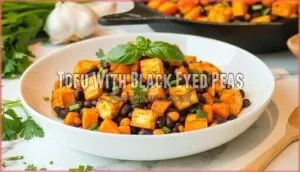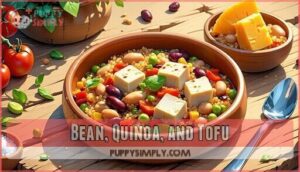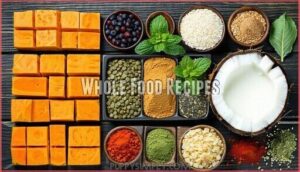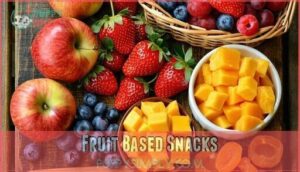This site is supported by our readers. We may earn a commission, at no cost to you, if you purchase through links.
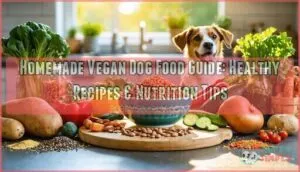
You’ll need complete proteins from legumes, quinoa, and tofu, plus healthy fats from flaxseed or coconut oil.
Essential nutrients include B12, taurine, and calcium supplements to fill gaps that meat typically provides.
Start with simple recipes combining beans, sweet potatoes, and vegetables, then gradually switch your dog over 7-10 days.
Monitor their energy, coat quality, and digestion closely, as well-planned vegan diets can support canine health effectively.
While some veterinarians remain skeptical, research shows that getting the protein ratios just right is the secret to supporting canine health on a vegan diet.
Table Of Contents
Key Takeaways
- You’ll need complete proteins from legumes, quinoa, and tofu, plus essential supplements like B12, taurine, and calcium to replace nutrients typically found in meat
- Transition your dog gradually over 7-10 days by mixing increasing ratios of vegan food with their current diet while monitoring their energy, coat quality, and digestion closely
- Homemade vegan dog food can cost 40-60% less than commercial options and lets you control ingredients to reduce allergies and customize nutrition for your dog’s specific needs
- You must consult your veterinarian before switching, especially for puppies who need animal proteins for proper development, and schedule regular check-ups to monitor your dog’s health throughout the transition process
Vegan Dog Food Benefits
Making your own vegan dog food can boost your pet’s health while cutting costs substantially.
You’ll have complete control over ingredients, which helps reduce allergic reactions and guarantees your dog gets the nutrition they need.
Improved Health Outcomes
Many dogs experience remarkable health improvements when you switch to vegan nutrition.
Vegan nutrition transforms your dog’s health naturally and dramatically.
This plant-based approach offers powerful disease prevention benefits while supporting ideal nutrient balance and wellness strategies.
- Reduced inflammation from eliminating common allergens in meat-based foods
- Better digestive health through fiber-rich plant ingredients that support gut function
- Improved coat shine from essential fatty acids found in seeds and oils
- Enhanced energy levels due to easily digestible, nutrient-dense whole foods
- Lower disease risk including reduced chances of kidney stones and certain cancers
Increased Cost Savings
Switching to homemade vegan dog food creates significant financial benefits.
Your grocery budget stretches further when you buy ingredients in bulk rather than premium commercial foods.
Cost analysis shows DIY dog food costs 40-60% less than store-bought alternatives.
Budget planning becomes easier with affordable options like beans, grains, and seasonal vegetables.
These savings strategies help you provide quality nutrition without breaking the bank, and by using DIY dog food, you can achieve this goal.
Customizable Nutrition
Beyond cost savings, homemade vegan dog food lets you create customized meal planning that perfectly matches your dog’s dietary needs.
You control nutrient balance and caloric intake while addressing specific health concerns.
Plant-based dog food recipes can include nutritional supplements suited to your pet’s age, size, and activity level, ensuring ideal vegan dog nutrition through personalized care.
Reduced Allergies
Customizing your dog’s nutrition gives you power to eliminate common allergens that plague many pets.
Vegan dog food naturally sidesteps typical triggers, offering your furry friend real itch relief.
Here’s how hypoallergenic diets help:
- Allergy testing becomes easier when you control every ingredient
- Food sensitivities decrease without common proteins like beef or chicken
- Skin health improves through plant-based omega fatty acids
- Homemade vegan dog food lets you avoid mystery ingredients
This vegan dog nutrition approach transforms your vegan puppy food into medicine.
Nutritional Guidelines
Creating the right nutritional balance for your dog’s vegan diet requires careful attention to four key components.
You’ll need to verify that adequate protein sources, healthy fats, complex carbohydrates, and essential vitamins work together to meet your pet’s specific dietary needs.
This involves ensuring that these components, including essential vitamins, are properly balanced to support your dog’s overall health and well-being.
Protein Sources
Your dog’s protein needs are like building blocks for health.
Strong protein builds healthy dogs from nose to tail.
Quinoa delivers complete amino acids in every cup of homemade dog food.
Legume options like lentils and peas pack digestible nutrition into vegan dog recipes.
Tofu benefits include high-quality soy alternatives that support muscle development.
Pea protein and lentil value create balanced plantbased dog food.
These combinations form the foundation of any effective vegan dog food guide for healthy vegan puppy food.
A well-planned vegan protein guide is essential for ensuring your dog receives the necessary nutrients for peak health and overall well-planned nutrition.
Healthy Fats
Your dog’s coat will shine when you include essential Omega fats in their homemade vegan dog food.
Add flax seeds and chia benefits through ground portions mixed into meals.
Coconut oil provides medium-chain fatty acids, while avocado oil delivers vitamin E.
These healthy fats support brain function and joint health in your plantbased dog food recipes, making your vegan dog food guide complete.
Complex Carbohydrates
Choosing the right fiber sources and starch types forms your healthy vegan dog food foundation.
Sweet potatoes and brown rice provide excellent grain options, while lentils offer legume benefits with digestible energy.
Root vegetables like carrots deliver natural sweetness and nutrients, these complex carbohydrates fuel your dog’s active lifestyle, supporting digestive health better than simple sugars found in many commercial vegan dog food brands, with digestible energy and natural sweetness being key, and also providing complex carbohydrates.
Essential Vitamins
Your homemade vegan dog needs specific vitamins to stay healthy.
Vitamin B12 supports red blood cells and prevents anemia in dogs eating plant-based diets. Add synthetic B12 supplements since plants don’t contain this vitamin naturally.
Include Vitamin D from UV-exposed mushrooms, plus Vitamin E from sunflower oil for immune support.
Consider vegan dog supplements containing these nutrients alongside probiotics and antioxidants for maximum nutritional value.
Homemade Recipes
Now you can prepare nutritious vegan meals for your dog using simple, whole-food ingredients from your kitchen.
These recipes combine protein-rich legumes, complete grains, and fresh produce to create balanced meals your pet will love.
Tofu With Black Eyed Peas
This protein-packed recipe combines tofu benefits with black eyed pea nutrition for complete plant based amino acids.
Cube firm tofu and mix with cooked black eyed peas, sweet potato, and carrots.
This homemade dog food provides excellent pea protein while supporting your pet’s shift to vegan nutrition.
The natural ingredients make this vegetarian dog food gentle on sensitive stomachs.
For more information on various tofu preparations, consider exploring tofu recipe options to enhance your pet’s meal.
Bean, Quinoa, and Tofu
This powerhouse combo delivers complete protein sources your pup needs.
You’ll combine kidney beans, quinoa, and firm tofu for a meal that’s both filling and nutritious.
The quinoa benefits include all essential amino acids, while tofu nutrition adds calcium and iron.
Here’s what makes this recipe shine:
- Complete proteins from combining beans and quinoa create amino acid profiles dogs require
- Easy preparation takes just 20 minutes from start to finish
- Budget-friendly ingredients cost less than premium commercial vegan dog treats
Cook quinoa according to package directions, mash beans slightly, and cube tofu before mixing everything together.
Ensuring the right nutrient balance is vital for your dog’s overall health and well-being.
Simple Banana Concoction
When your dog needs a quick energy boost, bananas make the perfect base for homemade vegan dog food.
This simple fruit blend combines mashed bananas with oats and a splash of water.
Banana nutrition provides potassium and natural sweetness that most dogs love.
Mix ingredients until smooth, then serve as a nutritious meal or use in vegan dog treats for introducing your dog to vegan diets gradually.
Whole Food Recipes
Throughout your kitchen adventures, creating vegan stews with plant proteins offers the best vegan dog food foundation.
Fresh fruits and whole wheat flour enhance nutritional balance while meal prep simplifies weekly routines.
Focus on these essentials for ideal plantbased nutrition:
- Sweet potato base with lentils and brown rice for sustained energy
- Tofu and quinoa blend providing complete amino acid profiles
- Coconut oil addition delivering essential fatty acids for coat health
Considering a plant based diet can substantially improve your dog’s overall health and wellbeing.
Vegan Dog Treats
You’ll love making homemade vegan dog treats that keep your furry friend healthy and happy.
These simple recipes use wholesome ingredients you probably already have in your kitchen, making treat time both nutritious and budget-friendly.
Peanut Butter Cookies
Simple cookie ingredients make these peanut butter dog treats irresistible. Mix natural peanut butter with oat flour and water for basic vegan baking success.
These homemade vegan dog food options beat store-bought alternatives every time. Follow baking tips like using xylitol-free peanut butter and checking temperatures regularly.
Perfect for introducing dogs to vegan diets gradually. For owners seeking more options, considering vegan dog alternatives can be highly beneficial for their pets, making them a great choice for vegan diets.
3 Ingredient Treats
While peanut butter cookies satisfy many pups, you can create equally delicious vegan bites with just three ingredients.
These homemade chews require minimal prep time and pantry staples. Mix oat flour, mashed banana, and coconut oil for healthy rewards your dog will love.
Roll into small balls and bake until firm. These natural dog food alternatives make perfect pet snacks without artificial additives or preservatives, providing healthy rewards and using minimal prep time.
Fruit Based Snacks
Sweetness becomes your best friend when crafting natural dog food treats from fresh fruit.
These homemade vegan dog food options offer healthy alternatives to store-bought snacks while supporting your dog as it adopts a vegan diet.
- Apple Slices – Remove seeds and core, then slice thin for easy chewing
- Berry Mix – Combine blueberries and strawberries for antioxidant-rich treats
- Mango Bites – Cut into small pieces, avoiding the pit completely
- Dried Apricots – Choose unsweetened varieties for organic vegan dog food benefits
Nutritious Biscuits
If your pup’s taste buds are bored after fruit-based snacks, nutritious biscuits are a smart way to shake things up.
Use simple Biscuit Ingredients like oats, carrots, and flaxseed to boost Dog Nutrition. These Vegan Recipes make Healthy Snacks that support Pet Wellness.
Grainfree vegan dog food options help when switching dog to vegan or homemade vegan dog food for a balanced dog diet. When selecting ingredients, consider the benefits of plant based diets to confirm a well-rounded nutrition plan.
Diet Transition Tips
Switching your dog to a vegan diet requires patience and careful observation to guarantee their health and happiness.
You’ll want to make changes slowly over several weeks while keeping a close eye on their weight, energy levels, and overall well-being.
Monitoring Weight
Keep careful tabs on your dog’s weight throughout their switch to grainfree vegan dog food.
Weekly weigh-ins help you catch changes before they become problems.
Here’s your weight management action plan:
- Weigh consistently – Same scale, same time weekly for accurate calorie tracking
- Monitor body condition – Feel for ribs and watch waistline definition changes
- Adjust feeding schedules – Increase portions if weight drops over 5% monthly
Most dogs need 2-3% of body weight daily when switching dog to vegan diets.
Use growth charts for puppies requiring closer pet health monitoring.
Tracking Health
During your dog’s vegan shift, Health Monitoring becomes your best friend.
Watch for changes in energy levels, coat shine, and bathroom habits.
Keep detailed Health Records of appetite, weight, and behavior patterns.
Schedule regular Veterinary Care check-ups to confirm your homemade vegan dog food meets nutritional needs.
Document everything for successful Dog Wellness tracking.
It’s also vital to understand the role of dietary supplements in maintaining your dog’s overall health.
Gradual Transition
Switch your dog’s diet slowly over 7-10 days using conversion phases.
Start by mixing 25% vegan food with 75% current food for days 1-3. Increase to 50-50 for days 4-6, then 75-25 for days 7-9.
Complete the diet adjustment on day 10 with full vegan meals. This meal scheduling prevents digestive upset while introducing affordable vegan dog food options gradually.
Consultation With Veterinarian
Professional veterinary care becomes your safety net when making dietary changes. Animal health experts can spot potential issues before they become serious problems.
Here’s what to discuss with your vet:
- Blood work baseline – Establish normal values before switching to homemade vegan dog food
- Supplement recommendations – Get specific guidance on B12, taurine, and other nutrients
- Monitoring schedule – Plan regular check-ups every 3-6 months during the adjustment period
Your vet consultation guarantees your dog’s wellness journey stays on track. They’ll help you create affordable vegan dog food recipes that meet nutritional needs, especially important for senior dogs or those with health conditions.
Frequently Asked Questions (FAQs)
How much homemade vegan food per day?
Feeding amounts depend on your pet’s size and activity level.
Most dogs consume 2 to 4 percent of their body weight in food daily, divided into two meals.
Calculate based on weight and consult your vet.
Can puppies eat homemade vegan dog food?
Puppies shouldn’t eat homemade vegan food during their vital growth phase. They need complete animal proteins, specific amino acids, and nutrients that plant-based diets can’t provide adequately for proper development.
What supplements are required for vegan dogs?
You’ll need vitamin B12, taurine, L-carnitine, and omega-3 fatty acids as essential supplements. A complete vitamin-mineral blend guarantees your dog gets adequate zinc, iron, and calcium for ideal health.
How to store homemade vegan dog food?
Waste not, want not" applies perfectly here.
Store your homemade vegan dog food in airtight containers in the fridge for up to three days, or freeze portions for longer storage lasting several months.
Conclusion
Surprisingly, your dog won’t miss bacon when you’ve mastered this homemade vegan dog food guide.
You’ve learned the essential nutrients, tried proven recipes, and discovered how proper planning creates thriving plant-based pups.
Remember to switch gradually, monitor your furry friend’s health, and consult your veterinarian throughout the process.
With dedication and the right knowledge, you’ll provide nutritious meals that support your dog’s wellbeing while aligning with your values.
- https://www.mypawco.com/is-your-dog-getting-enough-protein-on-a-vegan-diet/
- https://petcubes.com/blogs/articles/exploring-alternative-protein-sources-for-dogs-a-comprehensive-guide
- https://opalpets.com/blogs/news/vegan-protein-guide-for-dogs
- https://earthanimal.com/blog/2025/03/04/the-power-of-plant-based-nutrition-for-dogs-science-ethics-and-evolution/
- https://v-dog.com/blogs/v-dog-blog/where-do-vegan-dogs-get-their-protein


